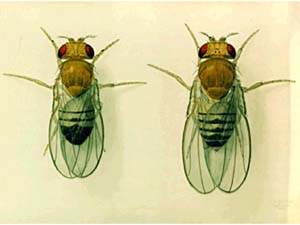THE LEHMANN
LAB

Dr. Michael Lehmann retired in 2024 after 22 years of running a Drosophila molecular genetics lab at the University of Arkansas. During this time, the lab used a
combination of genetic, cytogenetic and biochemical approaches to study the coordinated regulation of development and metabolism.
In the Lehmann lab, we were interested in signaling processes that regulate and coordinate development, growth and metabolism. In the
past, we have
studied how steroid hormones trigger the programmed death of cells at specific times and in specific tissues during development. In the final years, our research focused on roles of a
protein of the Lipin family in metabolism and development. In particular, we were interested to understand how Lipin, which is required for normal fat tissue development and cell
growth (see illustrations to the left and to the right below) is integrated in regulatory networks that control development and growth. These networks include
nutrient-sensitive (TOR), growth factor-controlled (insulin) and steroid hormone-controlled signaling pathways. Our data showed that Lipin interacts with all of these
pathways. However, there is still work to be done to understand the exact nature of these interactions. To find answers to our questions, we took advantage of the wealth of information and
experimental tools available for our model organism, the fruit fly Drosophila melanogaster. These tiny insect have proven to be excellent genetic models for studying basic biology for
more than 100 years.


Lipins and the regulatory pathways that we were studying are highly conserved between flies and humans. Thus, the results of our work may guide work in human and other mammalian
experimental systems. Ultimately, they may help in the fight against disease. For instance, a better understanding of proteins of the Lipin family may be of impact in the fight
against the increasing incidence of obesity, which is burdening health care systems around the world.
These materials are not endorsed, approved, sponsored, or provided by or on behalf of the University of Arkansas,
Fayetteville.


